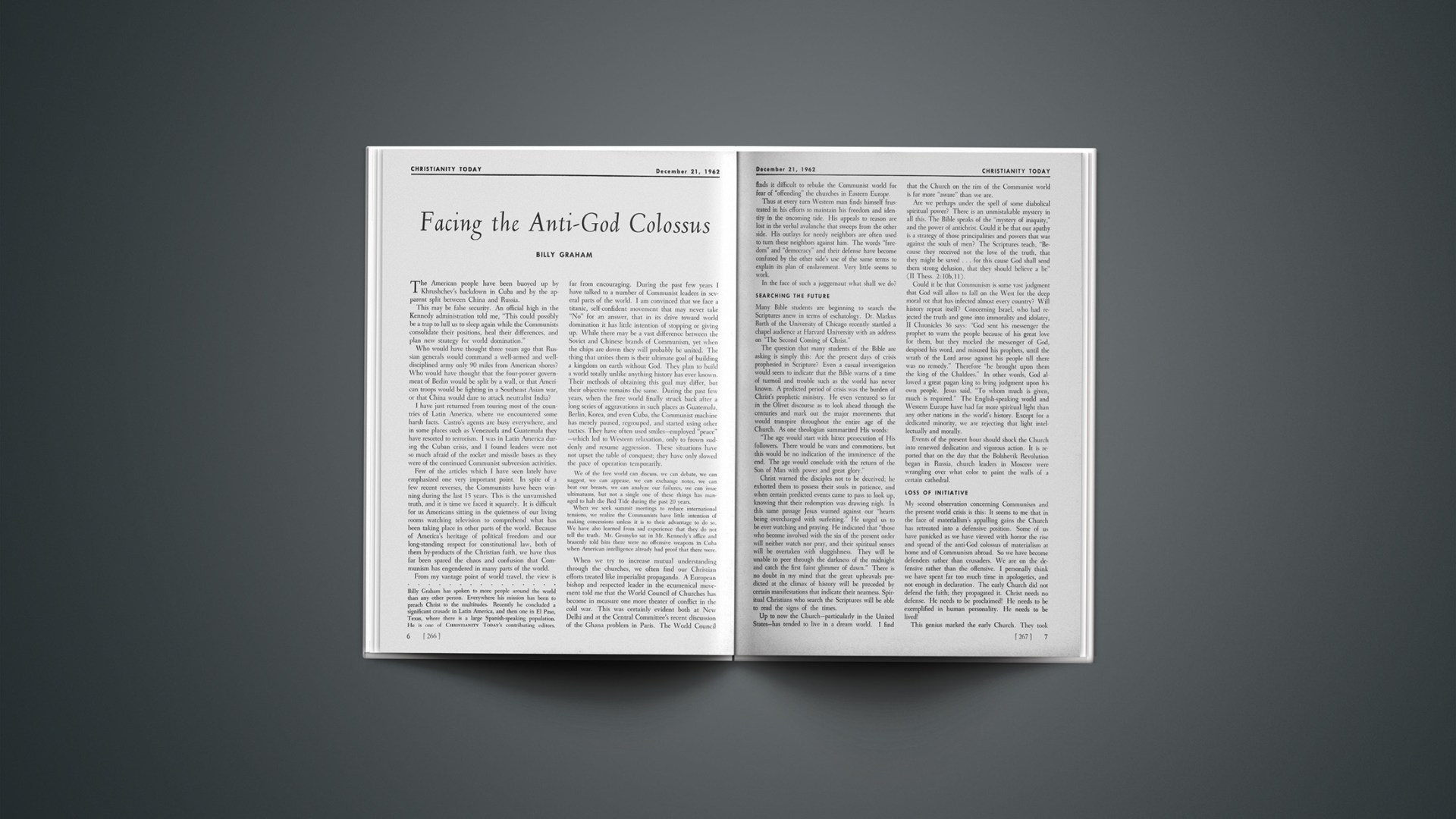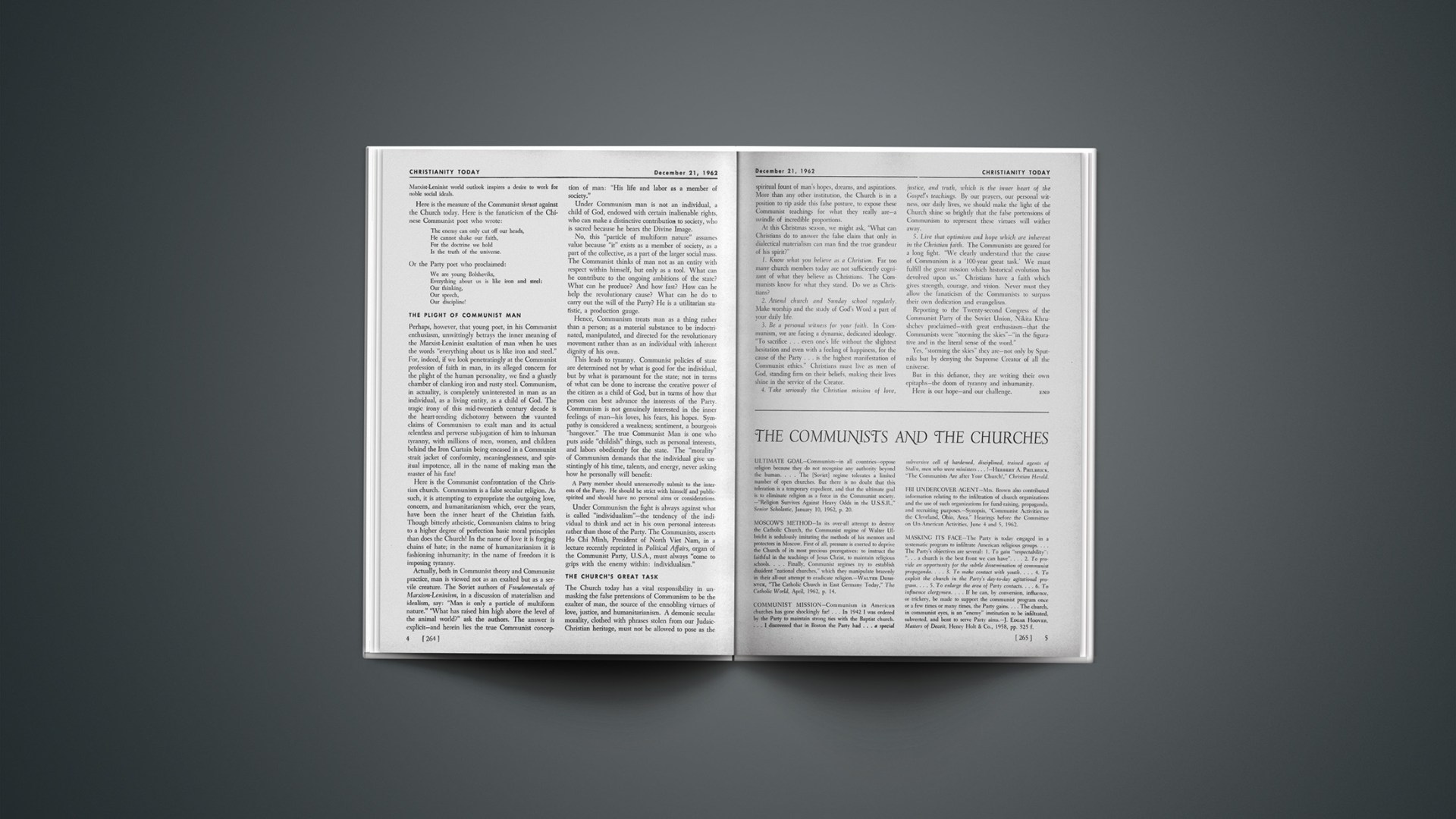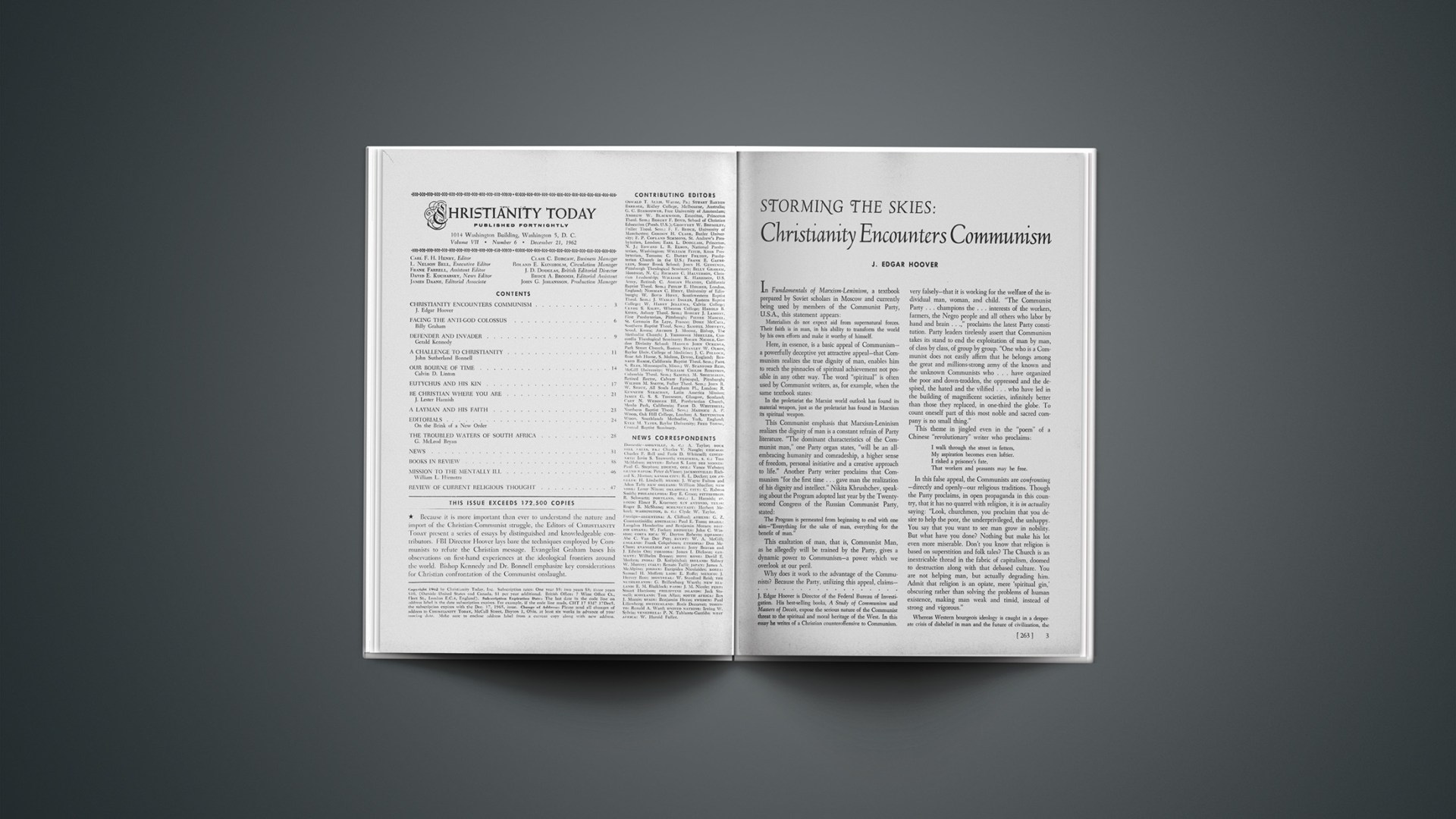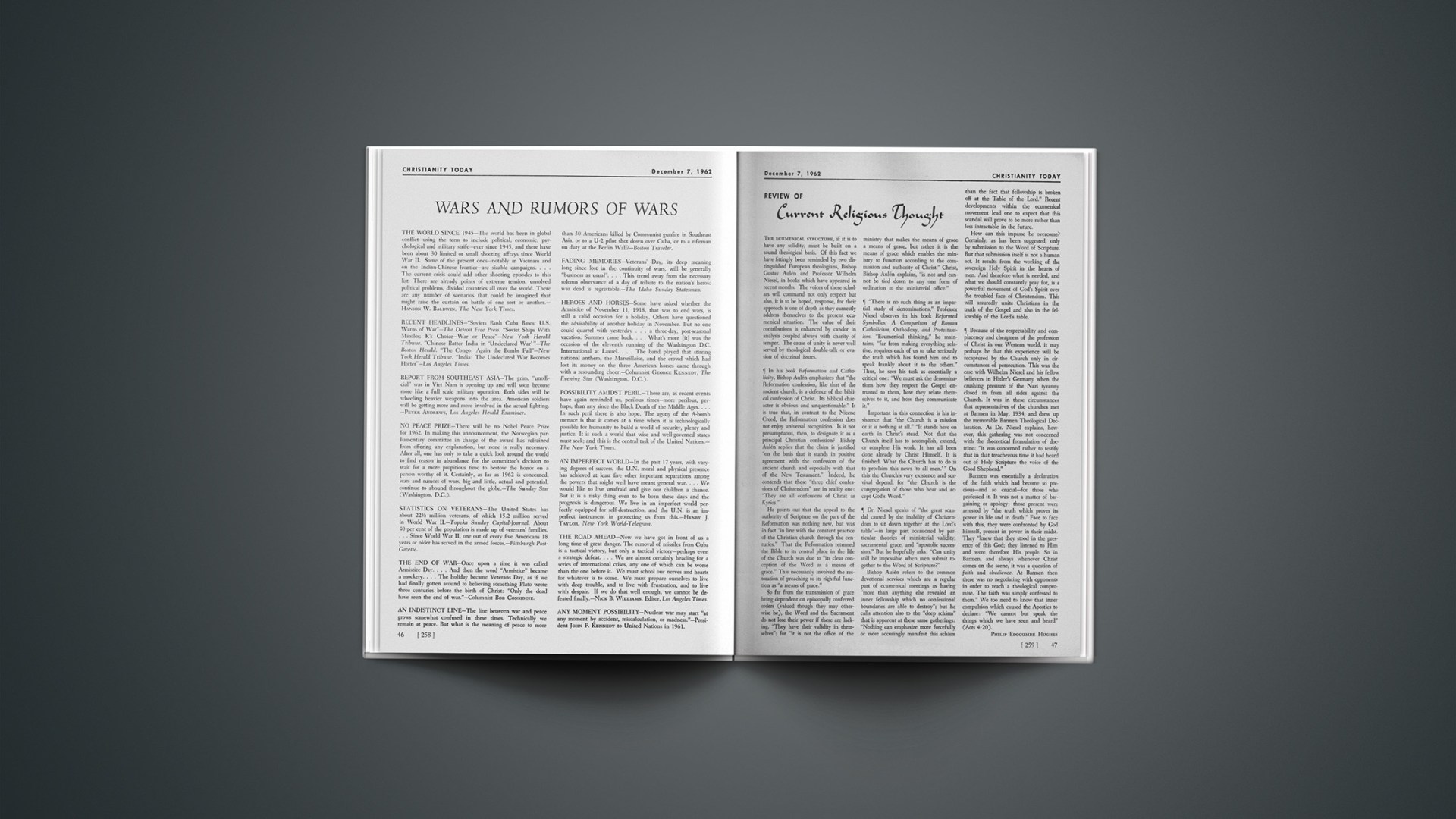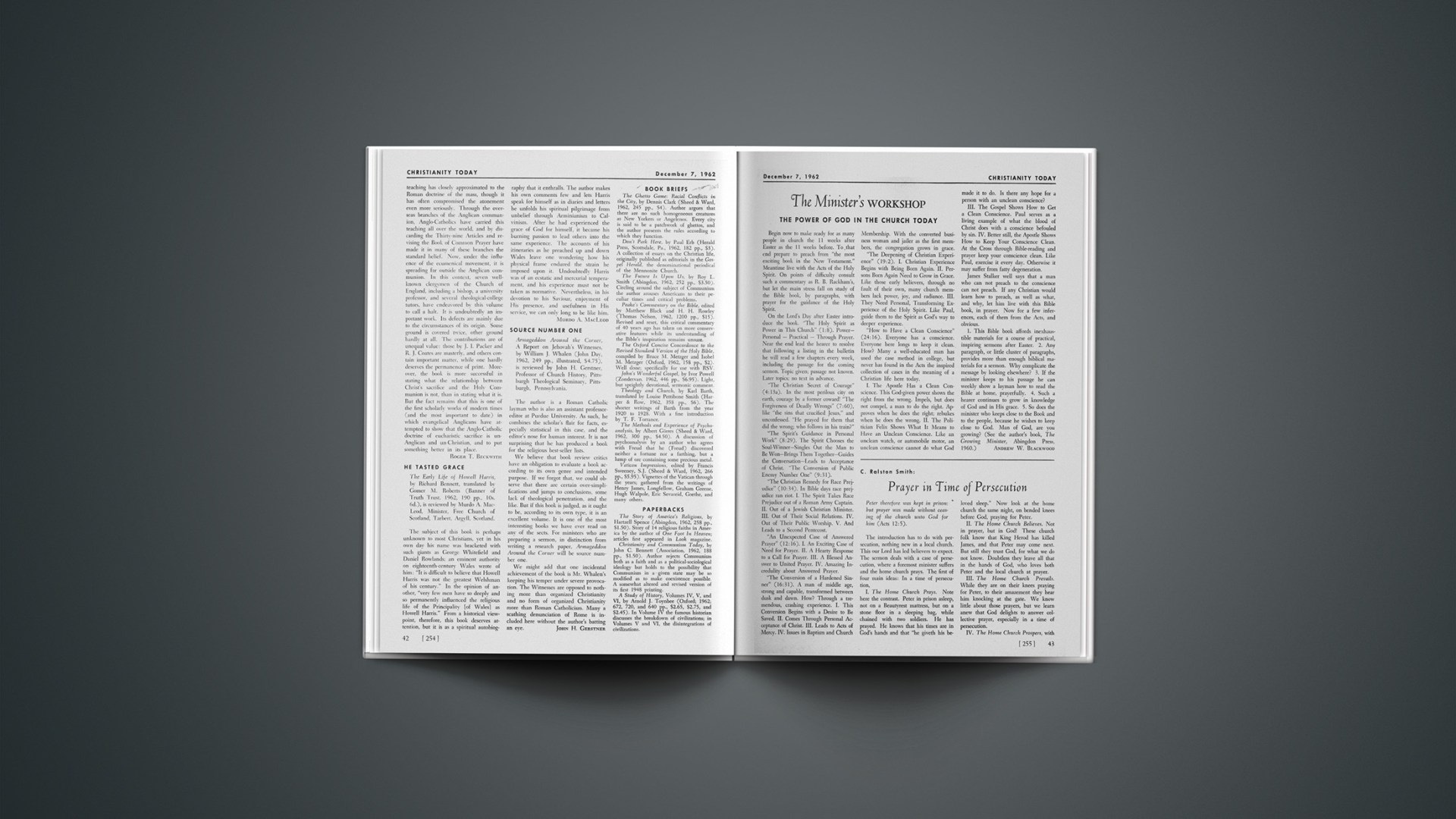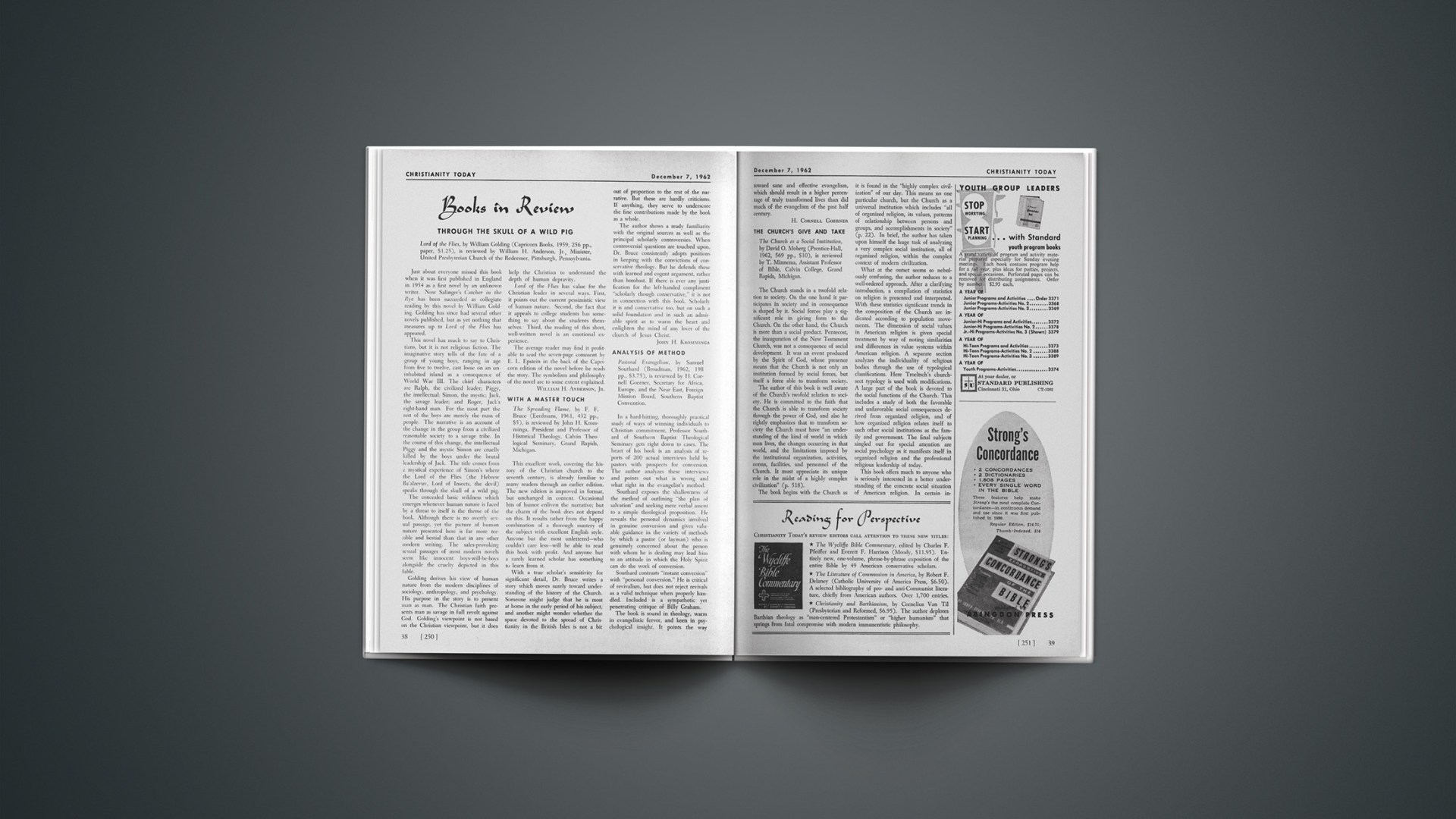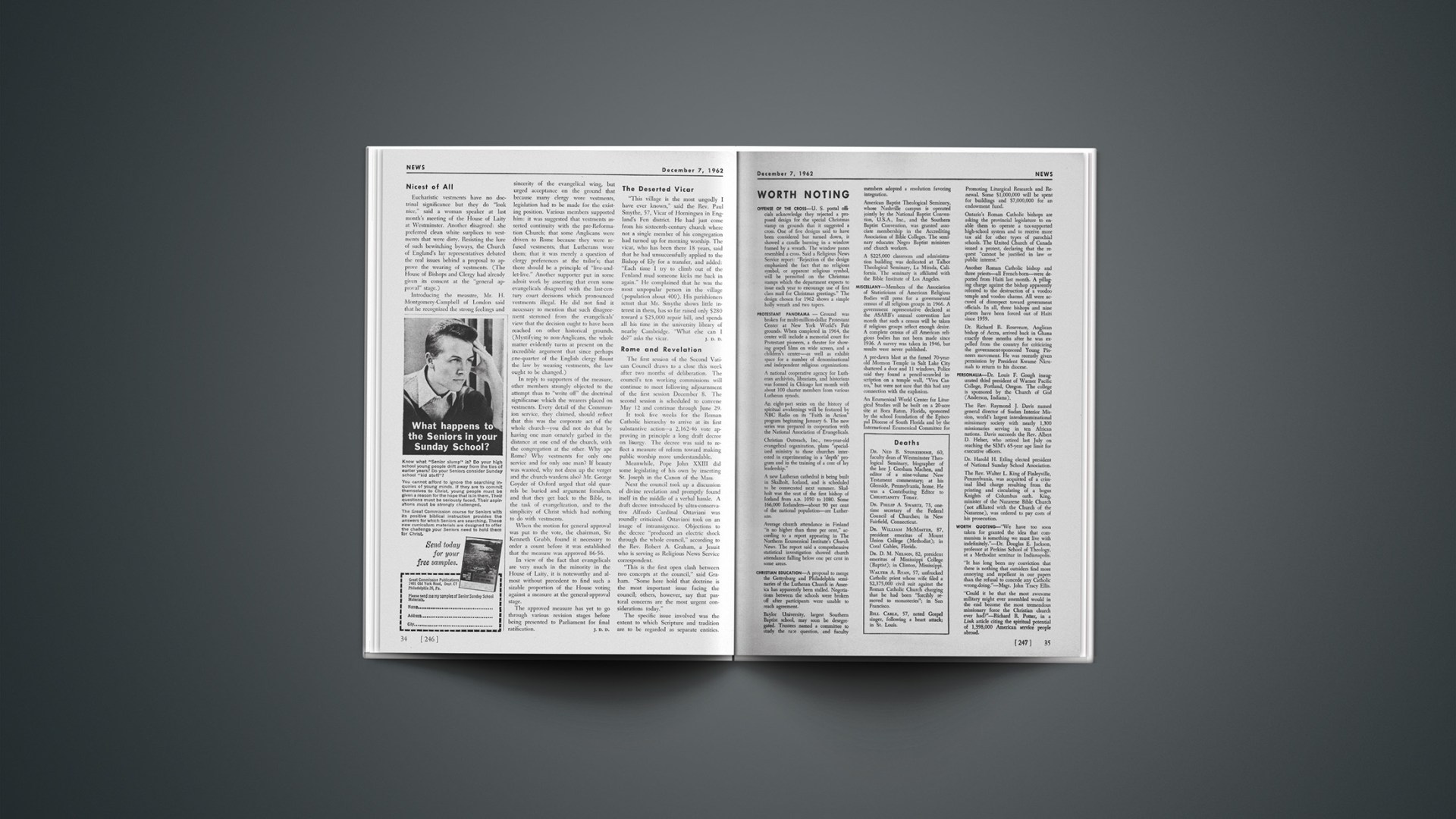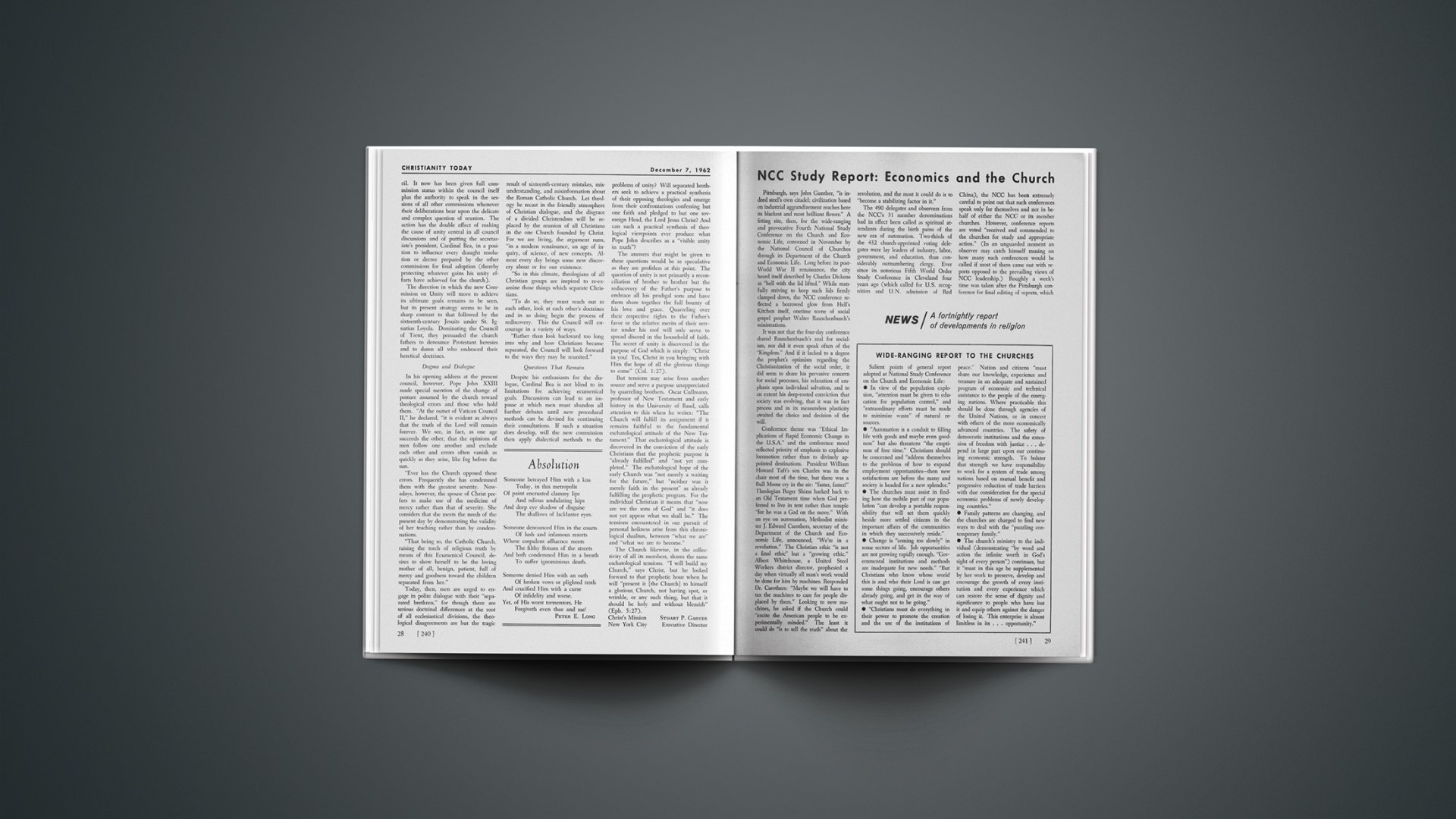The American people have been buoyed up by Khrushchev’s backdown in Cuba and by the apparent split between China and Russia.
This may be false security. An official high in the Kennedy administration told me, “This could possibly be a trap to lull us to sleep again while the Communists consolidate their positions, heal their differences, and plan new strategy for world domination.”
Who would have thought three years ago that Russian generals would command a well-armed and well-disciplined army only 90 miles from American shores? Who would have thought that the four-power government of Berlin would be split by a wall, or that American troops would be fighting in a Southeast Asian war, or that China would dare to attack neutralist India?
I have just returned from touring most of the countries of Latin America, where we encountered some harsh facts. Castro’s agents are busy everywhere, and in some places such as Venezuela and Guatemala they have resorted to terrorism. I was in Latin America during the Cuban crisis, and I found leaders were not so much afraid of the rocket and missile bases as they were of the continued Communist subversion activities.
Few of the articles which I have seen lately have emphasized one very important point. In spite of a few recent reverses, the Communists have been winning during the last 15 years. This is the unvarnished truth, and it is time we faced it squarely. It is difficult for us Americans sitting in the quietness of our living rooms watching television to comprehend what has been taking place in other parts of the world. Because of America’s heritage of political freedom and our long-standing respect for constitutional law, both of them by-products of the Christian faith, we have thus far been spared the chaos and confusion that Communism has engendered in many parts of the world.
From my vantage point of world travel, the view is far from encouraging. During the past few years I have talked to a number of Communist leaders in several parts of the world. I am convinced that we face a titanic, self-confident movement that may never take “No” for an answer, that in its drive toward world domination it has little intention of stopping or giving up. While there may be a vast difference between the Soviet and Chinese brands of Communism, yet when the chips are down they will probably be united. The thing that unites them is their ultimate goal of building a kingdom on earth without God. They plan to build a world totally unlike anything history has ever known. Their methods of obtaining this goal may differ, but their objective remains the same. During the past few years, when the free world finally struck back after a long series of aggravations in such places as Guatemala, Berlin, Korea, and even Cuba, the Communist machine has merely paused, regrouped, and started using other tactics. They have often used smiles—employed “peace”—which led to Western relaxation, only to frown suddenly and resume aggression. These situations have not upset the table of conquest; they have only slowed the pace of operation temporarily.
We of the free world can discuss, we can debate, we can suggest, we can appease, we can exchange notes, we can beat our breasts, we can analyze our failures, we can issue ultimatums, but not a single one of these things has managed to halt the Red Tide during the past 20 years.
When we seek summit meetings to reduce international tensions, we realize the Communists have little intention of making concessions unless it is to their advantage to do so. We have also learned from sad experience that they do not tell the truth. Mr. Gromyko sat in Mr. Kennedy’s office and brazenly told him there were no offensive weapons in Cuba when American intelligence already had proof that there were.
When we try to increase mutual understanding through the churches, we often find our Christian efforts treated like imperialist propaganda. A European bishop and respected leader in the ecumenical movement told me that the World Council of Churches has become in measure one more theater of conflict in the cold war. This was certainly evident both at New Delhi and at the Central Committee’s recent discussion of the Ghana problem in Paris. The World Council finds it difficult to rebuke the Communist world for fear of “offending” the churches in Eastern Europe.
Thus at every turn Western man finds himself frustrated in his efforts to maintain his freedom and identity in the oncoming tide. His appeals to reason are lost in the verbal avalanche that sweeps from the other side. His outlays for needy neighbors are often used to turn these neighbors against him. The words “freedom” and “democracy” and their defense have become confused by the other side’s use of the same terms to explain its plan of enslavement. Very little seems to work.
In the face of such a juggernaut what shall we do?
Searching The Future
Many Bible students are beginning to search the Scriptures anew in terms of eschatology. Dr. Markus Barth of the University of Chicago recently startled a chapel audience at Harvard University with an address on “The Second Coming of Christ.”
The question that many students of the Bible are asking is simply this: Are the present days of crisis prophesied in Scripture? Even a casual investigation would seem to indicate that the Bible warns of a time of turmoil and trouble such as the world has never known. A predicted period of crisis was the burden of Christ’s prophetic ministry. He even ventured so far in the Olivet discourse as to look ahead through the centuries and mark out the major movements that would transpire throughout the entire age of the Church. As one theologian summarized His words:
“The age would start with bitter persecution of His followers. There would be wars and commotions, but this would be no indication of the imminence of the end. The age would conclude with the return of the Son of Man with power and great glory.”
Christ warned the disciples not to be deceived; he exhorted them to possess their souls in patience, and when certain predicted events came to pass to look up, knowing that their redemption was drawing nigh. In this same passage Jesus warned against our “hearts being overcharged with surfeiting.” He urged us to be ever watching and praying. He indicated that “those who become involved with the sin of the present order will neither watch nor pray, and their spiritual senses will be overtaken with sluggishness. They will be unable to peer through the darkness of the midnight and catch the first faint glimmer of dawn.” There is no doubt in my mind that the great upheavals predicted at the climax of history will be preceded by certain manifestations that indicate their nearness. Spiritual Christians who search the Scriptures will be able to read the signs of the times.
Up to now the Church—particularly in the United States—has tended to live in a dream world. I find that the Church on the rim of the Communist world is far more “aware” than we are.
Are we perhaps under the spell of some diabolical spiritual power? There is an unmistakable mystery in all this. The Bible speaks of the “mystery of iniquity,” and the power of antichrist. Could it be that our apathy is a strategy of those principalities and powers that war against the souls of men? The Scriptures teach, “Because they received not the love of the truth, that they might be saved … for this cause God shall send them strong delusion, that they should believe a lie” (2 Thess. 2:10b, 11).
Could it be that Communism is some vast judgment that God will allow to fall on the West for the deep moral rot that has infected almost every country? Will history repeat itself? Concerning Israel, who had rejected the truth and gone into immorality and idolatry, 2 Chronicles 36 says: “God sent his messenger the prophet to warn the people because of his great love for them, but they mocked the messenger of God, despised his word, and misused his prophets, until the wrath of the Lord arose against his people till there was no remedy.” Therefore “he brought upon them the king of the Chaldees.” In other words, God allowed a great pagan king to bring judgment upon his own people. Jesus said, “To whom much is given, much is required.” The English-speaking world and Western Europe have had far more spiritual light than any other nations in the world’s history. Except for a dedicated minority, we are rejecting that light intellectually and morally.
Events of the present hour should shock the Church into renewed dedication and vigorous action. It is reported that on the day that the Bolshevik Revolution began in Russia, church leaders in Moscow were wrangling over what color to paint the walls of a certain cathedral.
Loss Of Initiative
My second observation concerning Communism and the present world crisis is this: It seems to me that in the face of materialism’s appalling gains the Church has retreated into a defensive position. Some of us have panicked as we have viewed with horror the rise and spread of the anti-God colossus of materialism at home and of Communism abroad. So we have become defenders rather than crusaders. We are on the defensive rather than the offensive. I personally think we have spent far too much time in apologetics, and not enough in declaration. The early Church did not defend the faith; they propagated it. Christ needs no defense. He needs to be proclaimed! He needs to be exemplified in human personality. He needs to be lived!
This genius marked the early Church. They took Jesus’ words literally: “And I, if I be lifted up, will draw all men nigh unto me.”
Rome was the “Moscow” of Christ’s day, and the goal of Roman imperialism was to bring the world under its dominion. In many ways, of course, Communism cannot be compared to Rome. For one thing, Communism has all the modern psychological techniques of “brainwashing.” It also has modern weapons whereby a relative few can control an entire nation. (Only 3 per cent of the people of the Soviet Union are Communists.) Despite the tyranny of Rome, however, I read no speeches in the Bible by Peter, John, or Paul against the political regime of their day. They preached Christ and they preached Christ alone. They declared his Lordship and his Redeemership, and did it within the context of a tyranny that eventually imprisoned and killed them. Their powerful Christian thrust was shortly to shatter the Roman imperial colossus, and to inaugurate the Christian era.
We are living in one of the most challenging periods of history. It has been my privilege to preach the Gospel in every part of the world, and in every area I have found dedicated followers of Jesus Christ. I have seen thousands of all races and speaking many languages march forward on every continent to receive Christ as Saviour. This age is a great time to be alive. These are days of unusual opportunity. Never before have we had such wonderful tools for propagating the faith.
Dwight L. Moody once said: “I look upon this world as a wrecked vessel. Its ruin is getting nearer and nearer. God said to me: ‘Moody, here is a lifeboat; … rescue as many as you can before the crash comes.’ ”
The Lord Of History
Another thing we must remember is that Christ is the Lord of history. “He is the same yesterday, today, and forever.” The calendar cannot contain him. Nothing takes him by surprise! Kingdoms are shattered, nations crumble, systems fall in the wake of him who is King of Kings and Lord of Lords. He shall have the final word, the final reign, the final glory, and the final judgment! Nothing, not even the gates of hell, can prevent his triumph.
Even today, in the Soviet Union, Jesus Christ is causing trouble! Newsweek recently reported: “American church leaders have been returning from the Soviet Union with reports of unexpected vitality in Russian religious worship. But the trend may be a fleeting one. The Communist party announced last week an accelerated drive against religion, including a major campaign for the popularization of atheism.”
The atheistic regime is disturbed by the undercurrent of Christian belief that persists despite redoubled efforts to stamp Christ out of the people’s conscience. Thus, by asserting his mastery of the present, Christ again vindicates his Lordship of history.
Until the day of his final victory and consummation there will be many upheavals and wars and rumors of wars. The Church may undergo persecution to an extent and with an intensity the world has never known. It is not impossible that the tide of Communism and materialism now sweeping the world may be motivated by the winds of divine judgment. In turn, however, God’s judgment will also descend upon the world of atheism, materialism, and worldliness. If the Scriptures are clear at all they are certainly clear on this point: “The kingdoms of this world shall become the kingdoms of the Lord and of his Christ.”
The Holy Spirit has kept me from the horrible abyss of thinking that man by his own accomplishment would bring all things to perfection. Instead, the Bible teaches that left to himself, sinful man will bring about all the disasters announced in its pages. It could well be that the weaknesses of the West, together with the failure of the Church, have made possible the strength of Communism.
The Christian posture should be one not of defense, but of preparation for “that day.” These should be days of personal rededication; of retreat into the closet of prayer; of girding our children for days of possible persecution because of their faith. I personally find myself studying far less for sermon preparation these days and more for devotional purposes, and pray that I may be worthy to suffer for Him if he so decrees.
The Church needs to develop an atmosphere in which martyrs are made. As Lester DeKoster has said, “The church’s whispers must become shouts; her lethargy must become enthusiasm; and her subdued light must become a beacon set upon the hilltops of the world.”
While she still has opportunity, the Church should evangelize with new vigor and call nations to repentance from sin to avert the coming crisis. The progress of history is not inevitable. Not even the progress of judgment is inevitable. When God decided to judge Nineveh, he sent Jonah to preach repentance. Nineveh repented of her sin and judgment was spared. Said Isaiah the prophet: “Except the Lord of hosts had left to us a very small remnant we should have been as Sodom, and we should have been like unto Gomorrah.”
When and in what measure judgment shall fall will be determined by the depth of the Church’s dedication to her Lord. Can we say that the Church as it exists in the United States is made up of God’s people? Are we the ones of whom the Scripture declares: “And they overcame him by the blood of the Lamb, and by the word of their testimony; and they loved not their lives unto the death” (Rev. 12:11)?
END

